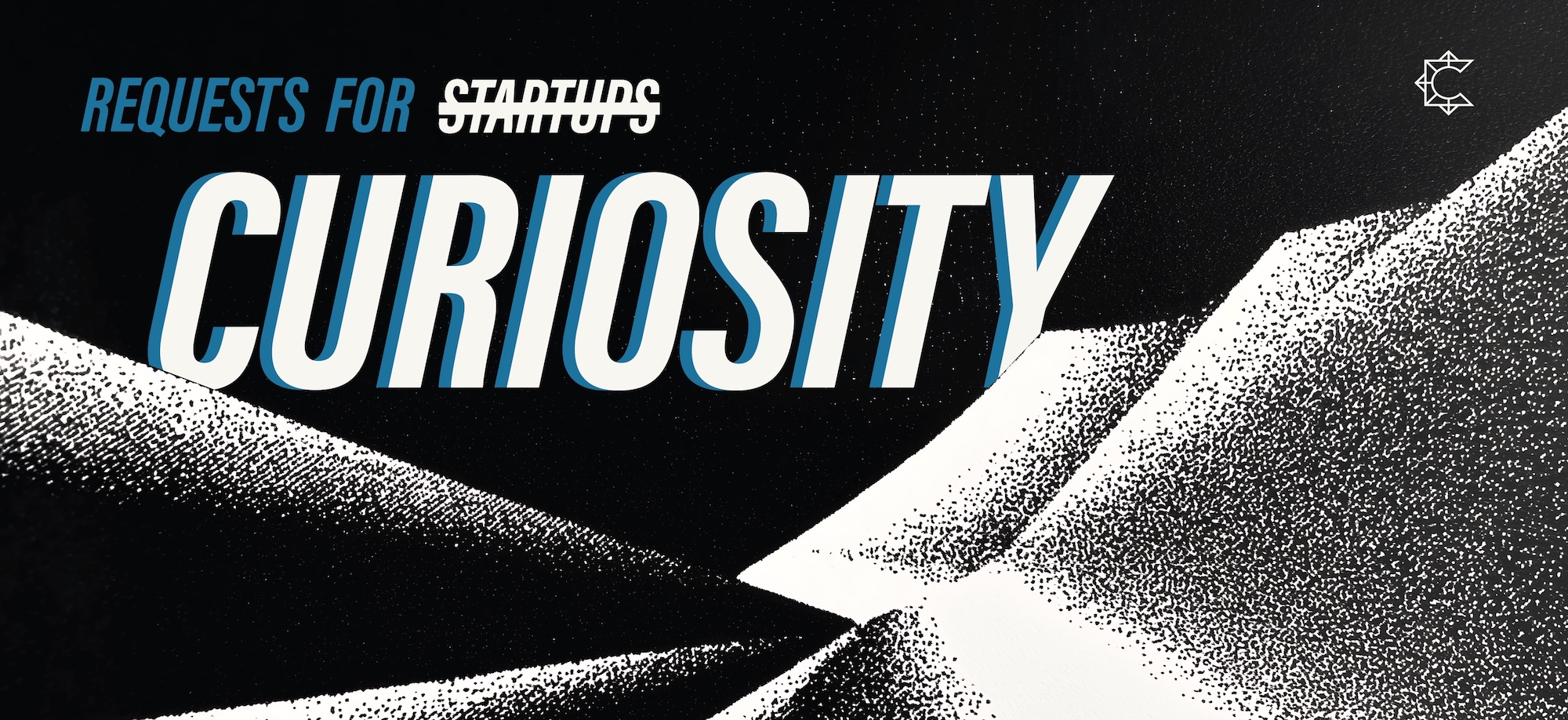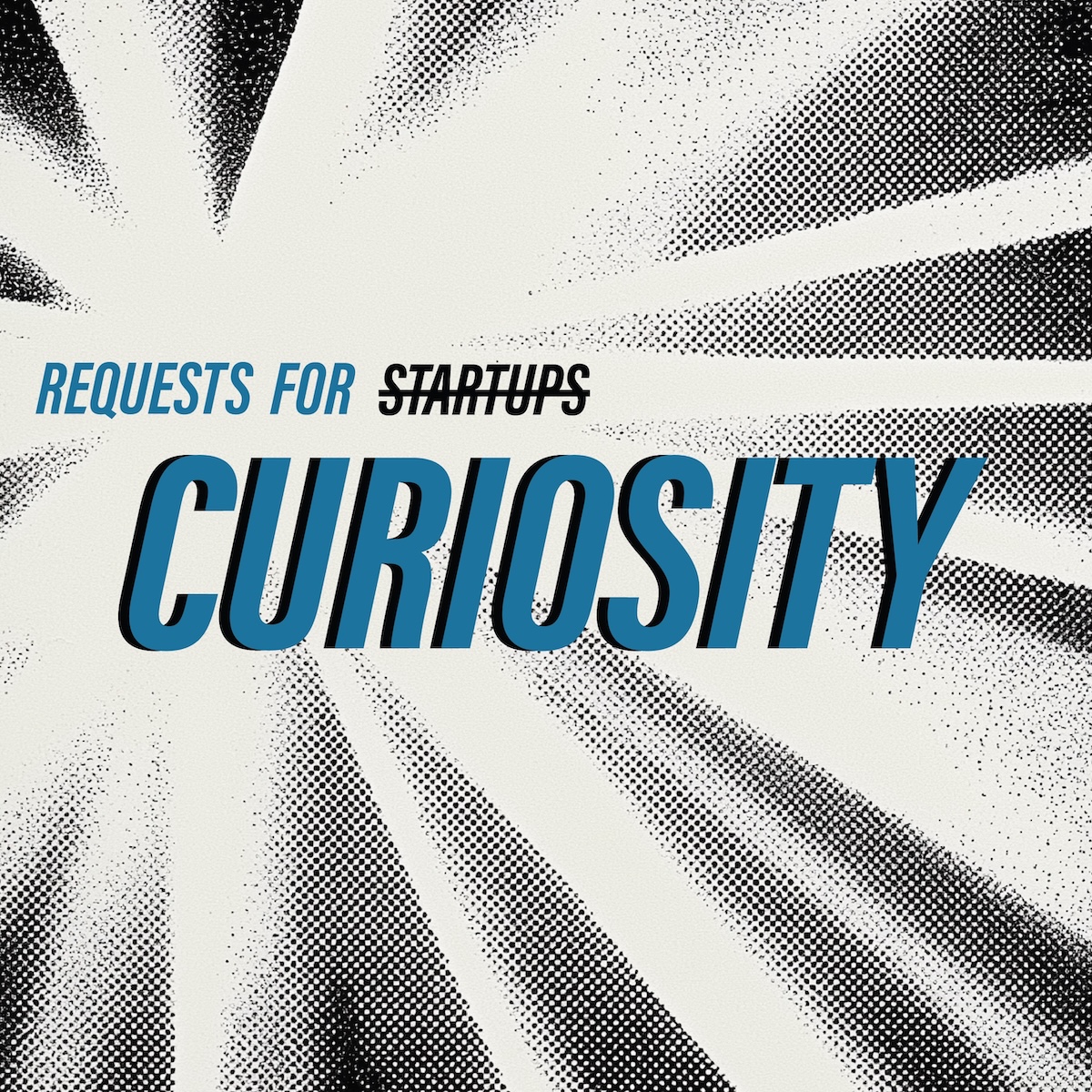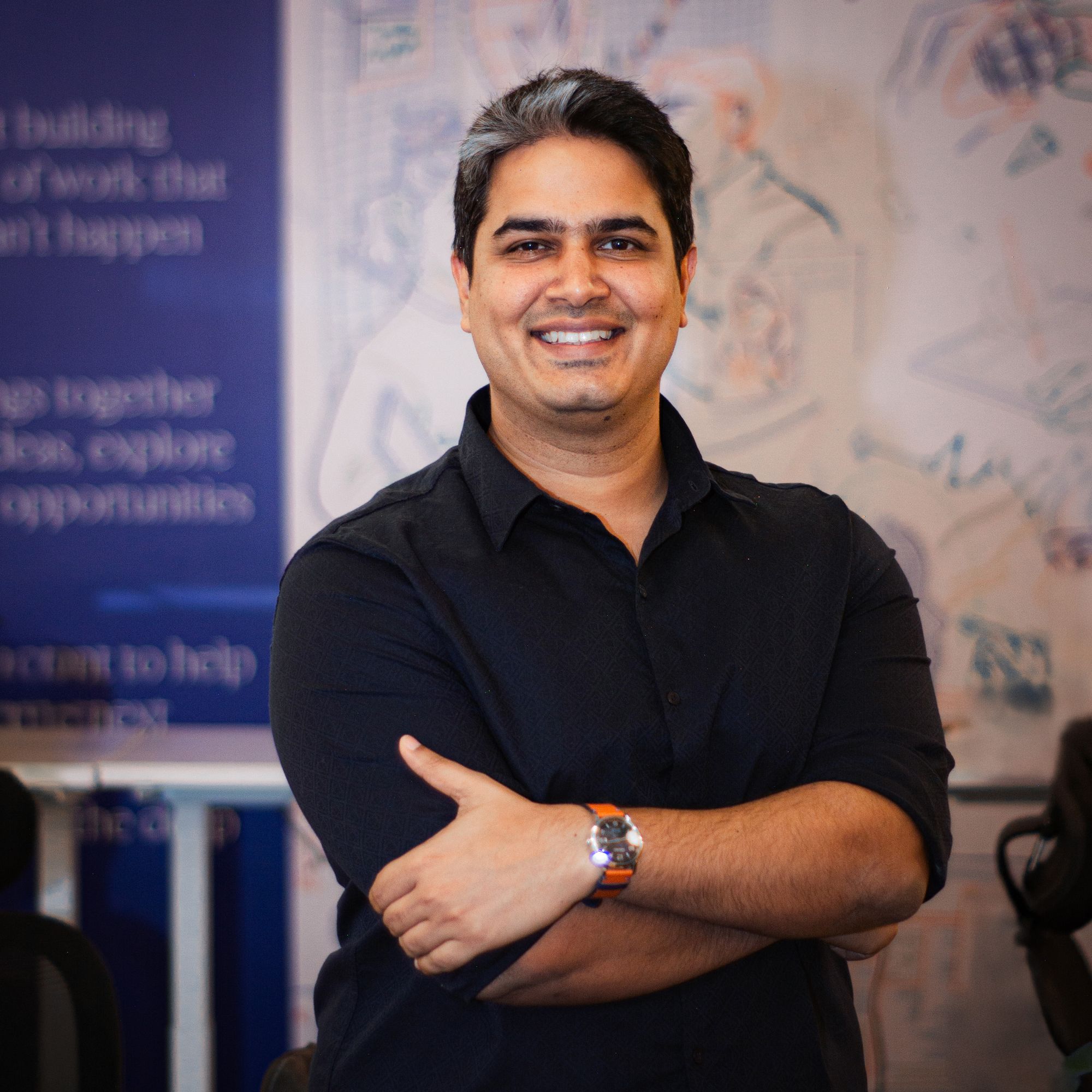SPC Request for Curiosity, Summer 2025
If you're exploring questions like these, we want to meet you.
2025-07-02

Request for Curiosity
_____________
Every great endeavor starts with questions, not answers. It starts at -1, not 0. Founders and technologists join SPC when they are still building conviction in the right idea. And we are certain: the best builders are also the most curious.
SPC provides a unique glimpse at where the most talented founders are paying attention. The questions our members explore is a leading indicator for where great ideas are waiting. If you are exploring any of the questions below, reach out to the SPC team member listed.
Or, better yet, apply to join SPC.
We don’t have requests for startups—we have requests for curiosity.
How will professional relationships evolve when mediated by AI agents?
Networking today relies on manual relationship building, conference small talk, and LinkedIn. Collaboration and connection at work emerge from patchworks of both formal structure and informal networks. But soon many of our coworkers might be agents.
- What happens when digital twins of professionals can simulate interactions and outcomes before actual, authentic connections are made?
- How will BD and RFP processes change when agents can automatically identify, qualify, and respond to partnership opportunities?
- How will middle-management evolve with more agents involved in decision-making?
- How will the cadence of human workdays change?
Reach out to: Evan, Prateek
How will labor markets respond to massive disruption from AI?
As AI eliminates entire categories of entry-level knowledge work, it will also enable new pathways to build expertise, generate income, and create a professional identity. The question isn't whether this will happen, but how quickly and what infrastructure needs to be built to support the post-institutional workforce.
- How will credentialing and skill verification work when traditional degrees and career paths become less relevant, and careers can span multiple platforms?
- How will professional development and skill acquisition evolve when AI can accelerate learning curves?
- What platforms will emerge to enable and accelerate more entrepreneurs?
- What new financial products and services do alternative career builders need?
- How do you interview, hire, and fire an AI worker?
Reach out to: Evan, Prateek
How do we realign the healthcare system around longevity?
With the help of consumer health platforms, patients are increasingly tracking their own metrics, slowly shifting patient behavior from reactive to proactive. We can imagine a new end to end patient experience for managing your health, and a shift in the “incentive layer” for insurance using new data—baseline scans, lab results, fitness tracking—that gives users more power over their health.
- How do roles change for healthcare providers when the user has more control and data?
- How can insurance incentivize consumers into early detection scans and regular health screenings?
- Could the resulting longitudinal data let us model risk more precisely than today’s actuaries?
- How could newly combined health history and metrics better suggest personalized action plans when sick?
- What compliance, privacy, and re-insurance hurdles appear when underwriting on near real-time biometrics?
Reach out to: Arian, Danh
What happens to school when AI is the smartest person in the room?
Many of the bottlenecks for hyperpersonalized education are disappearing. So is the labor market that shaped current education systems.
- How do we deliver a personalized AI tutor to every learner, making supported education universal?
- How will the physical classroom evolve, and what new forms of mixed media learning will emerge?
- What tech will transform how learning flows between school, home, and personal study?
- How will education spending shift between public and private schools, higher education, and families?
Reach out to: Prateek, Gopal
What if every interface were liquid and every signal a prompt?
The chat box isn’t the end state of user interfaces. Soon AI will be able to generate sophisticated, malleable interfaces with a variety of inputs, all in real-time.
- What does a product look like when you assume the LLM is ambient?
- What latent behaviors (history, screenshots, location, etc.) can be reinterpreted as prompts?
- What interfaces would we build if the goal were to eliminate explicit prompting?
- How might malleable interfaces enable startups to make any legacy system feel and perform like modern software?
- How do we solve trust and verification when interfaces can be generated arbitrarily?
- Who are the users that voice interfaces can uniquely empower?
Reach out to: Finn, Evan
How will AI accelerate human discovery?
Scientific progress has always been constrained by human cognitive limitations and the formal structures built around them. We're approaching a world where AI systems enable new forms of scientific inquiry at superhuman speed and scale, but it’s unclear what the most important rate limiters will be.
- What specific scientific workflows can AI meaningfully accelerate without compromising rigor?
- How do we validate AI‑suggested experiments and assign liability for failures?
- How does expertise accumulate in disciplines with massively accelerated research cycles?
- What business models sustain advanced tools in grant‑constrained labs?
- Can video models help us better simulate and understand the real world?
- How do we turn more scientists and researchers into founders?
Reach out to: Ruchi, Jonathan, Evan
What will make consumer electronics interesting again?
The recent history of consumer hardware is sad. Big Tech delivers increasingly incremental improvements or new platform duds with unclear paths to widespread adoption, while newer entrants have struggled and flamed out.
- Are there older form factors that will be reinvigorated by better AI integration?
- What are the right kinds of models to deploy on different device types, and what infrastructure is needed to deploy them?
- What will the first consumer BCI devices look like and enable?
- Do consumers want to stay on their phones or abandon them for something different?
Reach out to: Arian, Jonathan
What if we treated the inbox like a database?
Email holds an incredible record of our work and personal lives—not just documents, but decisions made, relationships built, and ideas exchanged. Yet search and discovery still suck, and every workflow has to be started manually.
- What does AI-native search look like when it understands context, not just keywords?
- How can AI track open loops, summarize threads, and extract action items across your inbox?
- Can we build agentic workflows on top of email for drafting & follow ups?
Reach out to: Finn, Danh
Will the future of entertainment be doomscrolling or dreamcrafting?
Social and entertainment platforms have mastered the art of farming human attention. AI shouldn’t just enhance existing formats, but unlock entirely new kinds of storytelling, interaction, and immersion. What will entertainment look like when it’s born from AI, not just touched by it?
- Can attention become a currency that humans have an active control over?
- What does entertainment look like when viewers can shape the content in real time?
- Will AI-native social networks emerge as entirely new platforms rather than extensions of existing ones?
- Why are there so few AI-native gaming experiences?
- How will we form and maintain relationships with AI characters?
Reach out to: Aditya, Jonathan
Who becomes famous in the age of infinite creative output?
Every major technological shift gives rise to a new kind of creator, someone who instinctively understands the medium and reshapes culture through it. Now, as we enter the AI-native era, the definition of "creator" is being rewritten once again.
- Will the new wave of creators be young builders without code, self-taught educators who lead by example, or will the “creator” itself no longer be human at all?
- Will AI shift the ratio between creators and consumers?
- How will authenticity be quantified, validated, and compensated as production costs go to zero?
Reach out to: Gopal
Can AI deepen instead of replace human-to-human connection?
Meaning often comes from the difficulty of doing something. Your friendships grow because you take the time to organize meet-ups. You learn because you struggle to understand. As AI reduces difficulty, it’s an open question if it can also increase human interaction and connection.
- How do we use AI to bridge cultural and linguistic divides?
- How can AI help us discover and surface latent relationships we didn't know existed?
- Can AI help us be more emotionally intelligent and empathetic in our human relationships?
- What role does memory, including forgetting, play in crafting more human experiences?
Reach out to: Evan, Prateek
What will enable truly multiplayer AI across teams and enterprises?
AI will transform collaboration across teams by making memory, context, and reasoning shared assets between humans and agents. AI-native messaging has the opportunity to become the nervous system for modern teams, supporting identity-awareness and intent-tracking.
- How do we design seamless handoffs within and beyond conversations between humans and agents?
- What kinds of primitives will multiplayer AI products need to include to manage the combinatorial explosion of interactions?
- What happens to someone’s “memories” when they leave a company? Who should that belong to?
- How will the personal agent evolve to reduce training costs for humans?
Reach out to: Gopal, Dylan
How do we build software around AI, not just with it?
We need frameworks that treat models as primitives, not bolt‑ons. Current tooling assumes the pre-coding agent paradigm. There's a huge opportunity to discover new ways of giving end-users access to these systems.
- What new foundational tools will enable the next wave of progress with reinforcement learning and test-time compute?
- How do we create frameworks that treat AI as a first-class citizen in software development, rather than just a code generation tool?
- How do we interleave AI prompts for model versus view states?
- How are programming languages evolving to handle AI's stochastic nature?
Reach out to: Aditya, Gopal
How can we think more creatively about productive hardware form-factors?
We’re about to see a proliferation of sensors across every environment humans and robots inhabit and navigate. Humanoids can’t possibly be the optimally-shaped robot for every situation.
- What sensor setups and coordination are needed to deploy AI hardware at scale?
- What becomes possible with increasing energy density in batteries?
- What will trigger the uncanny valley response with non-humanoid robots? Does it matter?
- How will increased data collection and hardware deployment work in sensitive environments like assisted living or childcare?
- How do government services like law enforcement work with embodied AI?
- Where have humanoid robots obscured more valuable form-factors?
Reach out to Dylan, Ankit
Can India leapfrog to world-class hard tech and defense tech?
Given the volatile nature of geopolitics in South Asia, there’s opportunity to create world-class defense primes and civilian hard tech that can operate in the local environment.
- What kinds of advanced autonomous platforms make sense in an Indian context?
- What are the indigenous capabilities in cybersecurity and signal intelligence required to effectively protect our critical infrastructure and become self reliant?
- What innovations are required today for India to meet its future energy needs?
- Why hasn’t India developed a more robust private space industry?
Reach out to: Aditya, Ankit
Are there any moats left?
As software is increasingly commoditized, difficulty becomes one of the few enduring moats. The best companies aren’t just solving big problems, they’re solving hard ones. Hardware is a good example: capital-intensive, slow to build, but deeply defensible once built.
- How can difficulties like technical risk, market illegibility, or capital intensity serve as a moat?
- What happens to user training and switching costs when any complex system can present itself as intuitively as a mobile app?
- What moat exists for traditional SaaS when coding agents can arbitrarily spin up solutions for any workflow?
- What happens when AI disintermediates entire industries?
Reach out to: Dylan
What happens to human agency when intelligence is free?
Widespread AI will rival the internet and electricity in impact, and that may be an underestimate.
- What new economies or art forms will be created when cognitive cost hits zero?
- How do we power, govern and fairly distribute near‑limitless machine cognition?
- What will people choose to do when confronted with the burden of infinite choice?
- What kinds of entirely new questions will we have to ask in a world of unlimited intelligence?
- What will superintelligence actually mean for humans?
Reach out to: Ankit, Jonathan

If you're exploring any of these questions, feel free to reach out to the SPC team member listed—or, better yet, apply to SPC for membership.











